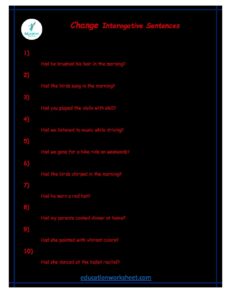Change to Past Perfect form interrogative
English Tense of Change to Past Perfect form interrogative
- Identify the Simple Present Tense Sentence: Start with a sentence in Change to Past Perfect form interrogative , which usually describes habitual actions, general truths, or present actions.Example: “She reads a book every evening.”
- Recognize the Auxiliary Verb and Main Change to past perfect form interrogative
- In the given sentence, the auxiliary verb is “does not exist” in Simple Present Tense. The main verb is “reads.”
- Form the Past Perfect Tense: To change this sentence to Past Perfect Tense, we use the auxiliary verb “had” and the past participle form of the main verb “read.”
- change verbs into past prefect tense

- Example (Past Perfect Tense): “She had read a book every evening.”
In this transformed sentence, we have changed the action (“read”) to have happened before a specific point in the past, indicated by the auxiliary verb “had.”
Understanding the Basics of Present Perfect and Past Perfect Tenses In the realm of English grammar, verb tenses play a crucial role in conveying the precise timing and relationship of actions or events in a sentence. Two Change to Past Perfect form interrogative that often cause confusion but are essential for conveying complex temporal relationships are the Present Perfect and Past Perfect tenses. This section aims to establish a strong foundation in understanding these tenses and set the stage for mastering the transformation of Present Perfect to Past Perfect in interrogative sentences.
The Present Perfect tense is formed using the auxiliary verb “have” or “has” (depending on the subject) and the past participle of the main verb. It is used to describe actions or events that have a connection to the present, either because they occurred recently, are ongoing, or have a lasting impact on the present moment. For example, “I have seen that movie before.”
-
Identify the Change to past perfect tense form interrogative
- Begin by identifying the base (infinitive) form of the verb that you want to Change to Past Perfect form interrogative . For example, consider the base verb “eat.”
- Form the Past Participle: Determine the Change to Past Perfect form interrogative of the verb. Regular verbs typically add “-ed” to the base form to create the past participle. For irregular verbs, the past participle forms vary and need to be memorized.Examples:
- Base Verb: “eat” → Past Participle: “eaten”
- Base Verb: “write” → Past Participle: “written”
- Base Verb: “go” → Past Participle: “gone”
- Apply “Had” as the Auxiliary Verb: Incorporate the auxiliary verb “had” before the past participle form of the Change to Past Perfect form interrogative .
Examples of Change to past perfect tense form interrogative
-
- “I had eaten dinner before I went to bed.”
- “She had written the report by the time I arrived.”
- “They had gone to the store before it started raining.”
On the other hand, the Change to Past Perfect form interrogative is constructed using the auxiliary verb “had” and the past participle of the main verb. This tense is employed to depict actions or events that happened before a certain point in the past, establishing a clear past-to-past relationship. For instance, “She had already left when I arrived.”
Subheading 2: Navigating the Transformation: Present Perfect to Change to Past Perfect form interrogative Sentences Transforming a sentence from Present Perfect to Past Perfect in interrogative form involves rearranging the auxiliary verb and adjusting the structure to reflect the change in tense. While this may seem daunting at first, a systematic approach and a thorough understanding of both tenses will simplify this transformation.
In an interrogative sentence using Change to Past Perfect form interrogative , we typically start with the auxiliary verb “have” or “has,” followed by the subject and the past participle form of the main verb. For example, “Have you seen the new art exhibit?”
To change this sentence to Past Perfect tense while maintaining the interrogative structure, we need to modify the auxiliary verb “have” to “had” and retain the subject and the past participle form of the main verb. Thus, the transformed sentence becomes, “Had you seen the new art exhibit?”
Subheading 3: Exploring Examples and Fine-Tuning the Transformation To solidify our understanding and skill in transforming Change to Past Perfect form interrogative in interrogative sentences, let’s delve into various examples and explore the nuances of this transformation.
- Original Present Perfect Interrogative Sentence: “Have you ever traveled to Europe?”
- change verbs into past prefect tense 180_PDFsam_Change into all 11 Tenses Key
 change verbs into past perfect tense
change verbs into past perfect tense

Change to Past Perfect form interrogative - Transformed into Change to Past Perfect form interrogative “Had you ever traveled to Europe?”
- Original Change to Past Perfect form interrogative Sentence: “Has he finished his assignment?”Transformed into Change to Past Perfect form interrogative : “Had he finished his assignment?”
By systematically analyzing and practicing similar transformations across a range of sentences and contexts, we can master the art of Change to Past Perfect form interrogative interrogative sentences to the Past Perfect form with confidence and accuracy.
Subheading 4: Enhancing Language Proficiency through Practice and Application Like any aspect of language learning, mastering the transformation of tenses requires consistent practice and application. Engaging in activities such as writing exercises, speaking drills, and interactive dialogues can significantly enhance our proficiency in seamlessly transforming Change to Past Perfect form interrogative sentences into the Past Perfect form.
Additionally, incorporating diverse reading materials, engaging with native speakers, and seeking guidance from language instructors or educational resources will further reinforce our understanding and application of this grammatical transformation. With dedication and practice, we can achieve fluency in utilizing the Change to Past Perfect form interrogative sentences, enhancing our overall command of the English language.

